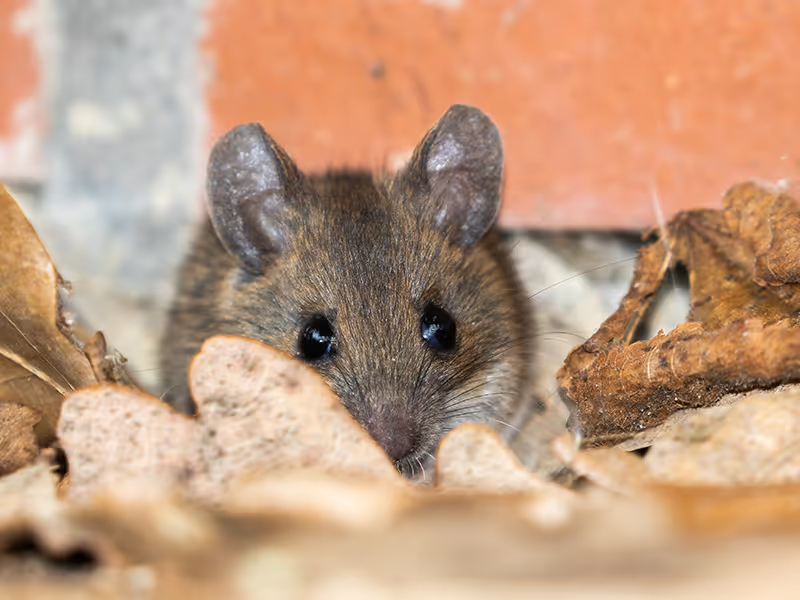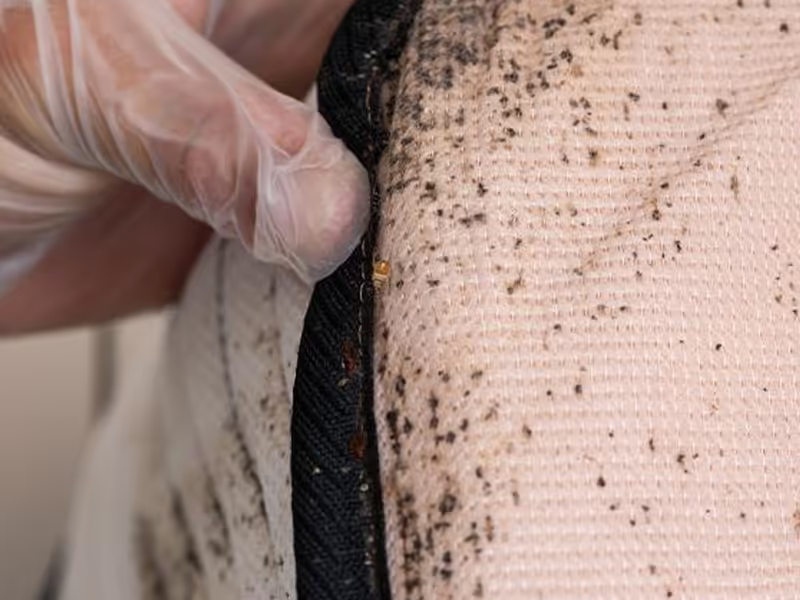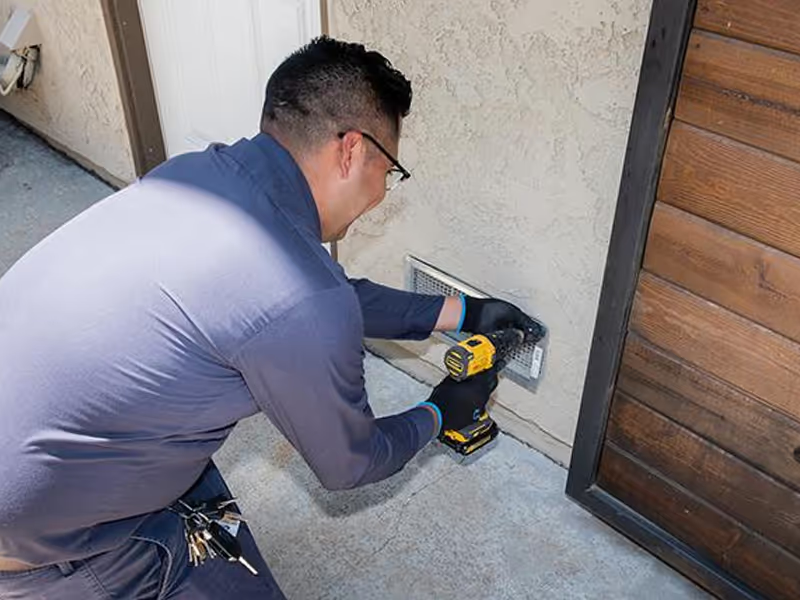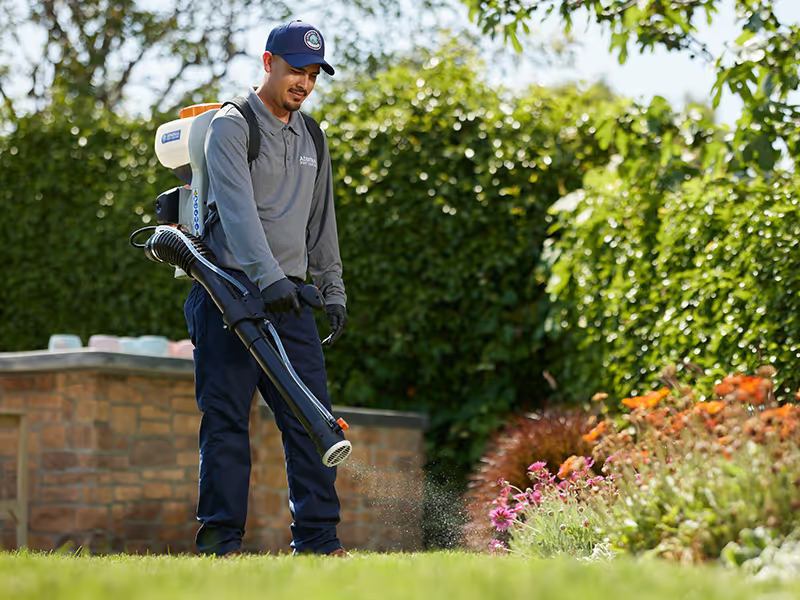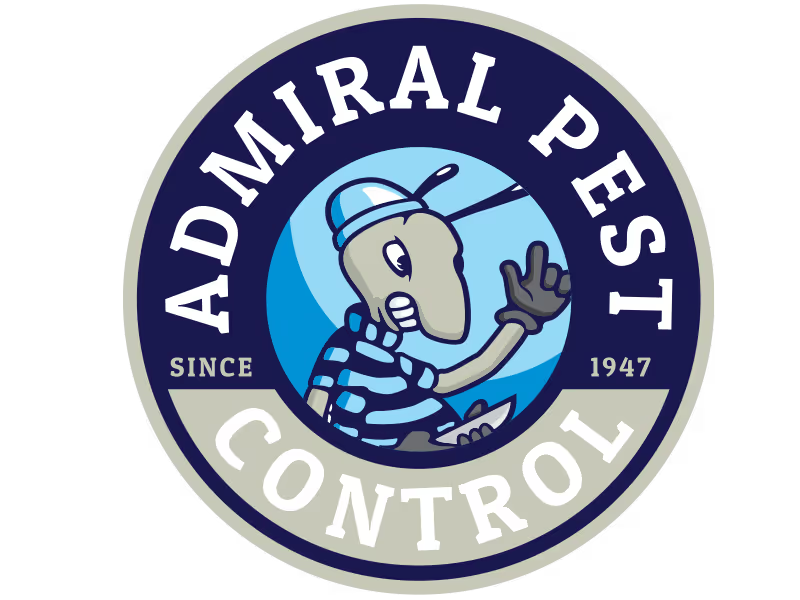Why Do I Suddenly Have Mice in My House?
It’s not unusual to suddenly notice mice in your home, especially during certain times of the year. Here’s why:
- Seasonal Changes: When temperatures drop in the fall and winter, mice look for warm places to nest. Your house offers both warmth and shelter.
- Food Availability: Mice are drawn to food sources like crumbs, leftovers, pet food, or improperly stored items.
- Clutter and Shelter: Cluttered spaces, like garages or basements, provide perfect hiding spots and nesting areas for mice.
- Easy Access: Small cracks, gaps, or poorly sealed areas around your home can act as an open invitation for these tiny intruders.
What Is the Most Common Way Mice Get Into a House?
Mice can squeeze through incredibly small spaces—holes as small as a dime! They’re resourceful and persistent, so they’ll exploit any weakness in your home’s defenses.
Here are the most common ways mice sneak into homes:
- Cracks and Gaps: Mice often enter through tiny cracks in walls, foundations, or floors. Even a small opening is enough for them to squeeze through.
- Doors and Windows: Poorly sealed doors and windows, especially those without proper weather stripping, can let mice in.
- Utility Lines: Gaps around pipes, wires, or vents provide easy entry points.
- Attics and Crawl Spaces: Mice can climb surprisingly well, so if your attic or crawl space isn’t sealed, they can get in.
- Drainage Pipes: Unsealed or improperly sealed drains and sewer lines can act as pathways into your home.
How Do You Find Where Mice Are Coming From?
Locating the entry points mice use is the first step to stopping them. Here’s how to do it:
- Inspect the Exterior: Walk around the outside of your house and look for cracks, holes, or gaps in walls, foundations, and around windows or doors.
- Check Inside: Look in common hiding spots, such as behind appliances, inside cabinets, or in the basement and attic.
- Follow the Droppings: Mice leave behind droppings wherever they go. Use these as clues to trace their paths and entry points.
- Use a Flashlight: Shine a light into dark corners or small spaces where mice might be hiding or entering.
- Listen for Noises: At night, listen for scratching or squeaking sounds that might indicate their presence.
How Can I Stop Mice From Getting in My House?
Preventing mice from entering your home requires some effort, but it’s worth it to keep your home pest-free. Follow these steps to mouse-proof your home:
- Seal Cracks and Holes: Use steel wool or caulk to fill small cracks and holes. For larger gaps, use metal mesh or cement.
- Fix Doors and Windows: Install weather stripping and repair or replace damaged door sweeps to eliminate gaps.
- Protect Utility Openings: Seal gaps around pipes, vents, and wires with durable materials like steel wool or caulk.
- Store Food Properly: Keep food in airtight containers and clean up crumbs or spills immediately. Don’t forget to store pet food properly, too.
- Declutter Your Home: Reduce clutter in garages, basements, and attics to eliminate potential hiding spots.
- Maintain Your Yard: Trim shrubs and keep firewood stored away from your house to reduce outdoor shelter for mice.
What Scent Will Keep Mice Away?
While no scent is 100% guaranteed to keep mice away, some smells are known to repel them because they dislike the strong odors. You can try these natural deterrents:
- Peppermint Oil: Mice hate the smell of peppermint. Soak cotton balls in peppermint oil and place them near entry points or in areas where you’ve seen mice.
- Cinnamon: The strong smell of cinnamon can deter mice. Sprinkle cinnamon powder in problem areas.
- Clove Oil: Similar to peppermint, clove oil can act as a natural mouse repellent.
- Ammonia: The smell of ammonia mimics predator urine, which can scare mice away. Be cautious when using ammonia indoors.
- Vinegar: A strong smell of vinegar can also help in repelling mice.
Remember, these scents may not solve the problem entirely, but they can be a helpful addition to other prevention methods.
What to Do if You See a Mouse in the House
Seeing a mouse in your house can be alarming, but you can take steps to handle the situation effectively:
- Stay Calm: Don’t panic! Mice are more scared of you than you are of them.
- Set Traps: Place snap traps or glue traps in areas where you’ve seen the mouse or noticed droppings.
- Use Bait: Peanut butter, cheese, or seeds make excellent bait for mouse traps.
- Seal Entry Points: Once the mouse is caught, immediately seal any cracks or gaps it may have used to enter.
- Clean Up: Sanitize the area to remove droppings, urine, or any food sources that might attract more mice.
- Call a Professional: If the problem persists or you suspect a larger infestation, contact a pest control expert.
Why Professional Help Might Be Necessary
While DIY methods can help with small problems, a large infestation often requires professional intervention. Pest control experts have the tools and knowledge to:
- Identify all entry points
- Eliminate existing mice and nests
- Prevent future infestations
- Provide long-term solutions
Final Thoughts
Mice might be small, but their ability to squeeze through tiny spaces and reproduce quickly makes them a big nuisance. By understanding how mice get in and taking proactive steps to prevent them, you can protect your home and peace of mind.
If you see signs of mice, don’t wait! Act quickly to seal entry points, remove attractants, and set traps. And if the problem gets out of hand, don’t hesitate to call a pest control professional to help you take control.
If you’re located in Orange county or Los Angeles county, contact Admiral Pest Control today if you’re dealing with a mouse problem. We will help you get rid of these pests in your home!

